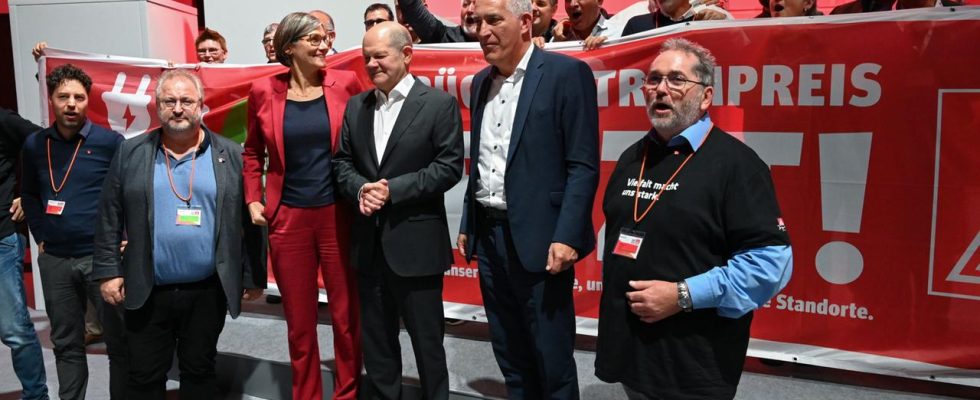analysis
At the IG Metall union conference, the political left was able to strengthen its influence purely in terms of numbers. But with the new board, the union wants to continue the pragmatic course of the past decades.
When a mass strike to reduce working hours in East Germany failed twenty years ago, union officials came to the realization on a broad basis: strikes that go beyond clear wage demands are expensive, often ineffective and then frustrating.
The realization came at a time of upheaval in the industry. Increasingly higher qualifications among employees required a different approach. More and more companies no longer produced mass-produced goods, but rather special products for small customer groups. This called for increasingly differentiated collective agreements with opening options for particularly solvent and also particularly weak companies.
Political upheaval under Chancellor Schröder
The shift to a more pragmatic trade union policy also affected the strong left wing of IG Metall. But political convictions were not abandoned. It was a highly politicized time in the union milieu. Large parts of the unions were disappointed by the business-friendly policies of the Social Democratic Chancellor Gerhard Schröder and his Labor Minister Walter Riester, who had previously been second chairman of IG Metall.
In this situation, “the worst thing that can happen to a trade unionist” happened to the then IG Metall boss Klaus Zwickel, as an official from the second row described it at the time: As a member of the supervisory board of the co-determined Mannesmann AG, Zwickel was responsible for paying millions to industrial managers. When the strike in East Germany also failed, he resigned. The leftist Jürgen Peters and the pragmatist Berthold Huber fought for the successor on an open stage. Finally, a truce was agreed upon: Peters became chairman, Huber his representative. After four years, Huber moved up.
During Peter’s term of office, Chancellor Schöder ran his “Agenda 2010” program. It was intended to combat mass unemployment, was welcomed by the middle class and widely condemned on the left as neoliberal. The senior IG Metall employee (“plenipotentiary”) Klaus Ernst founded a West German voter initiative that merged with the East German PDS to form the party “Die Linke”.
Hard road to pragmatism
Not only is the cadre politics and the fight between Peters and Huber in IG Metall today considered a deterrent example. At the headquarters in Frankfurt am Main, the attempt to gain political influence by founding a party is now viewed as an aberration for a union. This caused lasting damage to the SPD, which could not be in the interests of trade unionists.
Political lessons and changes in the world of work and industry led IG Metall to its overall pragmatic policy. It was a difficult journey. Just five years ago, a works council leader said in the official newspaper “Direkt” that the “face of IG Metall is often too one-sided and characterized by red flags and whistles. This does not appeal to many groups, such as academics or young people.”
Aging union
But the change is clear. Where the hardships of wage labor under capitalism were once lamented, the newspaper “Metall” is publishing more and more portraits of proud skilled workers and articles on professional knowledge. Employers praise sensible discussions with highly qualified trade unionists. “The folklore doesn’t bother us,” says an experienced employer official about demonstrations before collective bargaining.
Attempts to recruit employees to join the union have been going on for 35 years. Only recently with some success. The union is aging; many retired members die. With great effort, membership has so far been stabilized at 2.2 million. Last year alone, 117,000 new members were recruited, 32,000 of whom were employees. IG Metall is still the largest trade union in the world.
Party preferences today
The new chairwoman Christiane Benner and her representative Jürgen Kerner are SPD members. The new board member Ralf Reinstädler ran for the Left Party in the Bundestag. Former board member Hans-Jürgen Urban never mentioned party membership. The sociology professor has always been a representative of the trade union left. On the board, Urban and Reinstädtler are responsible for peripheral areas such as education, social policy and internal matters.
The new board member Nadine Boguslawski is not known to be a party member. Boguslawski is not only the treasurer of the billion-dollar fortune (“main cashier”), but is also responsible for collective bargaining policy and thus the union’s core task. The trained electronics technician with industrial experience was head of the important union branch in Stuttgart. At 45, she is significantly younger than the rest of the board. Boguslawski only completed her official training after the upheavals two decades ago.

